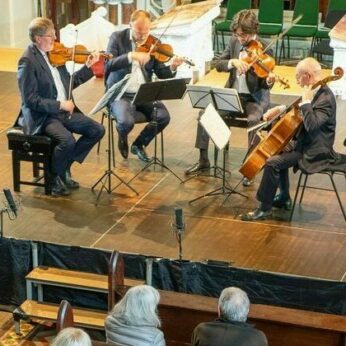Composer: Mieczyslaw Weinberg (b. 1919 - d. 1996)
Performance date: 02/07/2022
Venue: St. Brendan’s Church
Composition Year: 1978
Duration: 00:23:15
Recording Engineer: Simon Cullen, Ergodos
Instrumentation: 2vn, va, vc
Instrumentation Category:String Quartet
Artists:
Quatuor Danel (Marc Danel, Gilles Millet [violins], Vlad Bogdanas [viola], Yovan Markovitch [cello] -
[quartet]

Mieczysław Weinberg [1919-1996]
String Quartet No.14 Op.122 [1978]
In one movement
the belief in the possibility of nourishing the true in art
The maturity of the late works of important artists is not like the ripeness of fruit. As a rule these works are not well rounded but wrinkled, even fissured. They are apt to lack sweetness, fending off with prickly tartness those interested in merely sampling them. They lack all that harmony which the classicist aesthetic is accustomed to demand from the work of art, showing more traces of history than of growth. Theodor Adorno
When asked in 1988 about his attitude to trends in contemporary music, he responded that I almost never gave any thought to it, because I have always written and continue to write as I hear and as I feel. This did not mean he was uninterested in his more avant-garde colleagues. He sought out a meeting with Sofia Gubaidulina: My meeting with Weinberg was very significant, very confidential and benevolent. He was one of those artistic personalities whose presence strengthens one in ones belief in oneself and in the belief in the possibility of nourishing the true in art….It has always been a miracle to me that in Mieczslaw Weinberg’s music the fire of freedom and truthfulness and great moral purity has been preserved, as only great personalities can.
The first movement of the Fourteenth Quartet is a great agonised shout of rage, impassioned duets for cello and violin that is then intensified and then intensified even more. Relentless short rhythmic mottos are bracketed by truly savage chords leading eventually to another grand detaché passage creating some kind of synthesis. This closes with sudden, abrupt chords.
The slow movement opens with a passionate cello solo, closely followed by the viola. This wonderful movement gives each instrument a chance to sing, giving us rare moments of exquisite beauty. It gently fades away holding onto the brief vision for as long as possible. The next two movements are muted throughout and merge together seamlessly. They both give the appearance of an almost philosophical musing, quite unlike his normal scherzos. Repeated pizzicatos introduce the fourth movement and set it on its way, something approaching a lyrical idea appears and hangs temptingly in the air, but the composer seems reluctant to succumb.
The Finale introduces promising melodic ideas as well a little staccato phrase that keeps intruding. The mutes get removed and the rage of the first movement is recalled in primary colours generating a hope for a bold resolution. But this is not Weinberg’s style any more, facile major key resolutions are hard to conjure when so many hopes have foundered. Instead we are given fragility and his version of the truth.
– Francis Humphrys
Copyright © 2025 West Cork Music. All rights reserved.
Designed and developed by Matrix Internet